新编实用英语综合教程 教案
新编实用英语综合教程1(第四版)Unit1Hello,Hi教案

Unit 1 Hello, HiUnit Goals1.Greet people and give responses: first meeting and meeting again2.Exchange personal information: name/address/telephone number/job/study3.Introduce people to each other4.Meet people at the airport5.Say goodbye to others6.Say hello in different languages7.Write a business cardWhat should you know about1.Etiquette of meeting and introducing people2.Etiquette of exchanging business cards3.Basic sentence structuresSection I Talking Face to Face1.Imitating Mini-Talks2.Acting out the Tasks3.Studying Email Information on the Internet4.Following Sample Dialogues5.Putting Language to UseSection II Being All Ears1.Learning Sentences for Workplace Communication2.Handling a Dialogue3.Understanding a Short Speech / TalkSection III Trying your Hand1.Practicing Applied Writing2.Writing Sentences and Reviewing GrammarSection IV Maintaining a Sharp EyePassage 1 :Information Related to the Reading PassageEnglish Expressions Borrowed from FrenchOver the long years, the English language has borrowed a great number of French words or expressions. Some of them have been so absorbed in English that speakers might not realize their origin. Other expressions like “faux pas” have retained their “Frenchness”, with which spe akers tend to sound modern. These expressions are often written in italics. The following are a few French expressions which are commonly used in English.1. Faux Pas: It refers to a socially awkward or tactless act, a foolish mistake, something that should not be done. 失礼2. au pair: A foreign female student who works for a family (cleaning and/or teaching the children) in exchange for room and board. 帮助料理家务换取住宿的外国女学生3. Bon appétit: The closest English equivalent is “Enjoy your meal” . 用餐愉快4. esprit de c orps: It is similar to “group spirit” or “morale”. 团队精神5. rendez-vous: In English it means “go to”. It can be used as a noun or a verb. 约会6. RSVP: This abbreviation stands for Répondez, s'il vous plaît, which means “Respond, please”.敬请回复7. bon voyage: a way of saying goodbye and wishing good luck 一路平安The Business Card: a Social Faux PasYou, like most people, probably have been in such a situation where you are being asked for a business card, and while reaching for it ... and ... oops ... “I'm sorry, I must be out at the moment” or “they must be in my other bag” or “I left them at the office, I'm sorry,” and the conversation continues on with some sort of story about how this “never happens to me” or “I knew I was forgetting something this morning ...”Missed connections are missed opportunities for business. Business cards are a useful marketing tool, and an easy one to have with you at all times. Not having your cards can be seen as being unprepared to market yourself and your business. Don't star t that new contact leaving them thinking “that person is already unprepared”.“Never leave home without it ...” There are so many things we often have to remember in this go-go world we are living in … but your business cards should ALWAYS be with you.Here are a few tips for you to go take care of this right now, so youdon't get caught in this situation:✧ If you don't have a job, get Networking Cards.✧ If you are employed, and haven't had new cards in 2 or more years,it couldbe time for an update: info update and photo update ...✧ Perhaps set a goal of handing out 5 cards a day.✧ Practice what you will say when handing them out. On a daily basis, thereare so many opportunities to do so. Grocery store lines, coffee shops, waiting on your car wash, meetings, and even the dog park!✧ Ask your network to network with and for you also by handing out a few!Work smarter, not necessarily harder!Language Points1 Explanation of Difficult Sentences1. (Para. 2) Missed connections are missed opportunities for business.Analysis: Missed is a verb's past participle used here as an adjective.The repeated use of the same word could bring out a stronger effect. Translation: 错失了联系就错失了商机。
新编实用英语综合教案模板
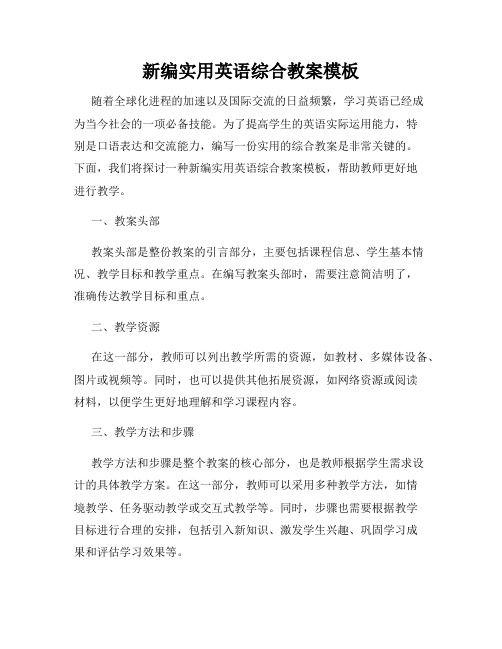
新编实用英语综合教案模板随着全球化进程的加速以及国际交流的日益频繁,学习英语已经成为当今社会的一项必备技能。
为了提高学生的英语实际运用能力,特别是口语表达和交流能力,编写一份实用的综合教案是非常关键的。
下面,我们将探讨一种新编实用英语综合教案模板,帮助教师更好地进行教学。
一、教案头部教案头部是整份教案的引言部分,主要包括课程信息、学生基本情况、教学目标和教学重点。
在编写教案头部时,需要注意简洁明了,准确传达教学目标和重点。
二、教学资源在这一部分,教师可以列出教学所需的资源,如教材、多媒体设备、图片或视频等。
同时,也可以提供其他拓展资源,如网络资源或阅读材料,以便学生更好地理解和学习课程内容。
三、教学方法和步骤教学方法和步骤是整个教案的核心部分,也是教师根据学生需求设计的具体教学方案。
在这一部分,教师可以采用多种教学方法,如情境教学、任务驱动教学或交互式教学等。
同时,步骤也需要根据教学目标进行合理的安排,包括引入新知识、激发学生兴趣、巩固学习成果和评估学习效果等。
四、教学内容教学内容是教案中重要的一部分,教师可以根据教学目标来合理选择内容,并制定对应的教学活动。
1. 语法和词汇语法和词汇是英语学习的基础,教师可以根据学生的英语水平选择相应的语法和词汇知识点。
在教学过程中,可以采用课件展示、讲解、练习和巩固等多种方式,帮助学生熟练掌握相关知识。
2. 口语表达口语表达是英语学习中的重要环节,教师可以通过各种情境对话、角色扮演和小组讨论等活动,激发学生的口语表达兴趣,提高他们的口语交际能力。
3. 听力和阅读听力和阅读是提高学生综合语言能力的关键环节,教师可以通过录音材料、视频资源以及精心设计的阅读材料,帮助学生提高听力理解和阅读能力。
五、教学辅助和综合评估在教学过程中,教师可以辅助使用教学工具和多媒体设备,如投影仪、电子白板或电脑等,以提高教学效果。
同时,教师也需要根据教学目标进行综合评估,包括学生的听说读写能力和学习态度等,以便及时调整教学策略。
新编实用英语综合教程第1册教学设计
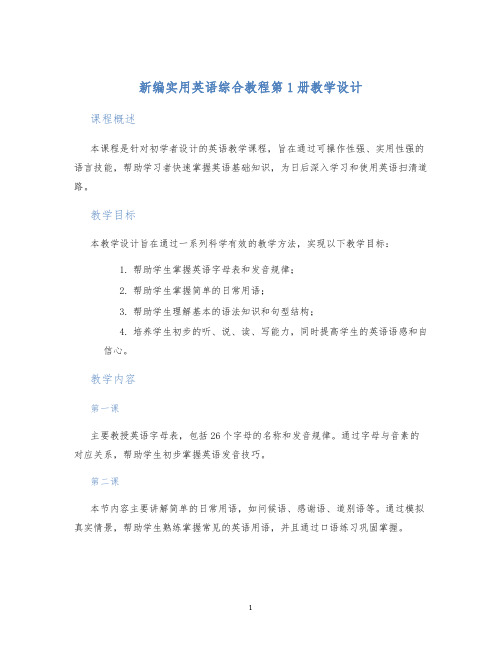
新编实用英语综合教程第1册教学设计课程概述本课程是针对初学者设计的英语教学课程,旨在通过可操作性强、实用性强的语言技能,帮助学习者快速掌握英语基础知识,为日后深入学习和使用英语扫清道路。
教学目标本教学设计旨在通过一系列科学有效的教学方法,实现以下教学目标:1.帮助学生掌握英语字母表和发音规律;2.帮助学生掌握简单的日常用语;3.帮助学生理解基本的语法知识和句型结构;4.培养学生初步的听、说、读、写能力,同时提高学生的英语语感和自信心。
教学内容第一课主要教授英语字母表,包括26个字母的名称和发音规律。
通过字母与音素的对应关系,帮助学生初步掌握英语发音技巧。
第二课本节内容主要讲解简单的日常用语,如问候语、感谢语、道别语等。
通过模拟真实情景,帮助学生熟练掌握常见的英语用语,并且通过口语练习巩固掌握。
第三课本节内容主要引导学生学习并掌握英语语法方面的基础知识,如主语、谓语、定语、状语等基本概念,并且通过练习巩固掌握。
第四课本节内容主要介绍英语代词、形容词、副词的基础知识,帮助学生掌握词汇量的同时,提高学生对英语语法的敏感性,同时辅以口语练习提高听说能力。
第五课本节内容主要让学生了解问题句型及回答方式,并帮助学生掌握各种相应句子类型的语法。
第六课综合性课程内容,巩固学生对前几节课的掌握,同时给予口语表达、语音、语法等方面的全面训练。
教学方法本教学设计将采用两大类方法,一类为传统教学方式,一类为现代教学方式。
传统教学方式1.讲授法:将基础知识讲授给学生,辅以学生手册和黑板板书,帮助学生初步掌握英语基础知识;2.练习法:通过不同形式的习题练习,巩固学生的掌握程度,并且帮助学生在做题过程中发现自己的不足,及时进行纠正。
现代教学方式1.互动式教学: 以学生为主体,让学生在讲师引导和促进下进行互动学习;2.多媒体教学: 利用现代多媒体教学手段,如PPT、录像等多媒体技术,结合学生实际情况和教学目标,对课程内容进行更直观、生动的展现。
新编实用英语综合教程2unit_1_教案
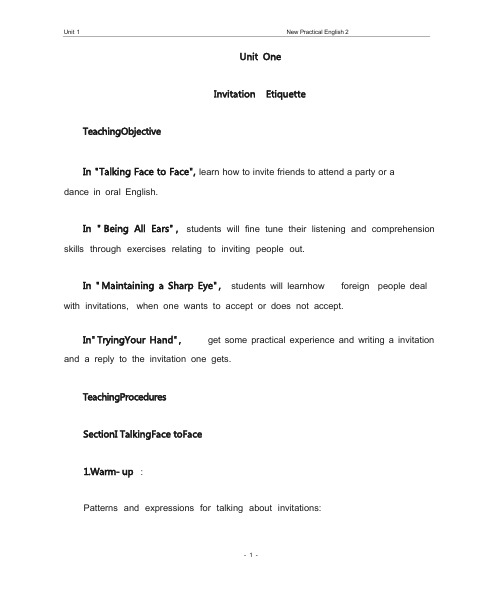
learn how to invite friends to attend a party or adance in oral English.students will fine tune their listening and comprehensionskills through exercises relating to inviting people out.students will learnhow foreign people dealwith invitations,when one wants to accept or does not accept.get some practical experience and writing a invitationand a reply to the invitation one gets.:Patterns and expressions for talking about invitations:I’dliketoinviteyoutodinner.我想请你吃晚饭。
Why don’t you come and join us for disco?你为什么不和我们一起跳迪斯科?It’s very kind of you to invite me.谢谢你邀请我。
How nice of you! Many thanks.你真好!多谢。
I’dlove to. That wouldbe grea t.我很愿意去。
太好了!Oh, dear, I’m afraid I’m busy tonight. Perhaps tomorrow evening?哦,亲爱的,今晚我很忙。
明晚也许可以吧?Could you make it another time, perhaps next Sunday?你能改个时间吗,下个星期天怎样?It’s very kind of you, but you see I’ll have to prepare for my exam.非常感谢,可你知道我得准备考试。
新编实用英语综合教程1(第四版)Unit 1 Hello,Hi教案
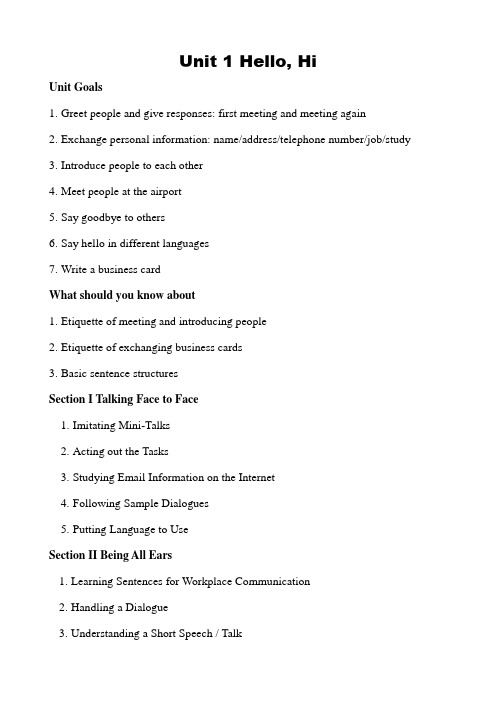
Unit 1 Hello, HiUnit Goals1.Greet people and give responses: first meeting and meeting again2.Exchange personal information: name/address/telephone number/job/study3.Introduce people to each other4.Meet people at the airport5.Say goodbye to others6.Say hello in different languages7.Write a business cardWhat should you know about1.Etiquette of meeting and introducing people2.Etiquette of exchanging business cards3.Basic sentence structuresSection I Talking Face to Face1.Imitating Mini-Talks2.Acting out the Tasks3.Studying Email Information on the Internet4.Following Sample Dialogues5.Putting Language to UseSection II Being All Ears1.Learning Sentences for Workplace Communication2.Handling a Dialogue3.Understanding a Short Speech / TalkSection III Trying your Hand1.Practicing Applied Writing2.Writing Sentences and Reviewing GrammarSection IV Maintaining a Sharp EyePassage 1 :Information Related to the Reading PassageEnglish Expressions Borrowed from FrenchOver the long years, the English language has borrowed a great number of French words or expressions. Some of them have been so absorbed in English that speakers might not realize their origin. Other expressions like “faux pas〞have retained their “Frenchness〞, with which speakers tend to sound modern. These expressions are often written in italics. The following are a few French expressions which are commonly used in English.1. Faux Pas: It refers to a socially awkward or tactless act, a foolish mistake, something that should not be done. 失礼2. au pair: A foreign female student who works for a family (cleaning and/or teaching the children) in exchange for room and board. 帮助料理家务换取住宿的外国女学生3. Bon appétit: The closest English equivalent is “Enjoy your meal〞. 用餐愉快4. esprit de corp s: It is similar to “group spirit〞or “morale〞. 团队精神5. rendez-vous: In English it means “go to〞. It can be used as a noun or a verb. 约会6. RSVP: This abbreviation stands for Répondez, s'il vous plaît, which means“Respond, please〞.敬请回复7. bon voyage: a way of saying goodbye and wishing good luck 一路平安The Business Card: a Social Faux PasYou, like most people, probably have been in such a situation where you are being asked for a business card, and while reaching for it ... and ... oops ... “I'm sorry, I must be out at the moment〞or “they must be in my other bag〞or “I left them at the office, I'm sorry,〞and the conversation continues on with some sort of story about how this “never happens to me〞or “I knew I was forgetting something this morning ...〞Missed connections are missed opportunities for business. Business cards are a useful marketing tool, and an easy one to have with you at all times. Not having your cards can be seen as being unprepared to market yourself and your business. Don't start t hat new contact leaving them thinking “that person is already unprepared〞.“Never leave home without it ...〞There are so many things we often have to remember in this go-go world we are living in … but your business cards should ALWAYS be with you.Here are a few tips for you to go take care of this right now, so youdon't get caught in this situation:✧ If you don't have a job, get Networking Cards.✧ If you are employed, and haven't had new cards in 2 or more years,it couldbe time for an update: info update and photo update ...✧ Perhaps set a goal of handing out 5 cards a day.✧ Practice what you will say when handing them out. On a daily basis, there are so many opportunities to do so. Grocery store lines, coffee shops, waiting on your car wash, meetings, and even the dog park!✧ Ask your network to network with and for you also by handing out a few!Work smarter, not necessarily harder!Language Points1 Explanation of Difficult Sentences1. (Para. 2) Missed connections are missed opportunities for business.Analysis: Missed is a verb's past participle used here as an adjective.The repeated use of the same word could bring out a stronger effect. Translation: 错失了联络就错失了商机。
新编实用英语综合教程(第四版)Unit-2教案
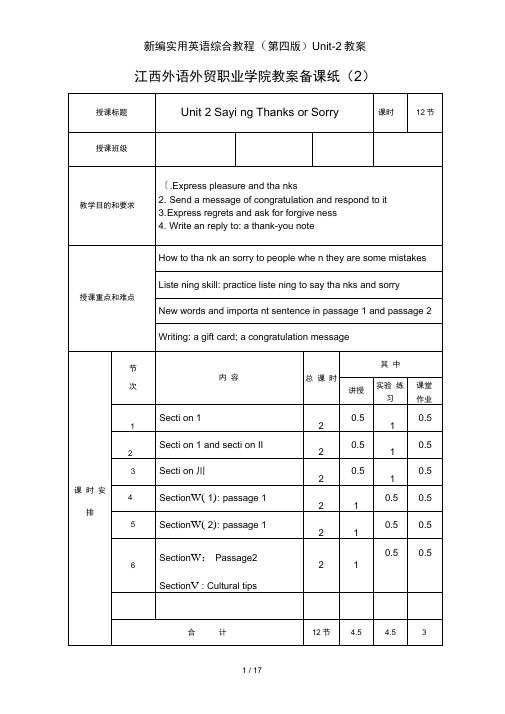
新编实用英语综合教程(第四版)Unit-2教案江西外语外贸职业学院教案备课纸(2)新编实用英语综合教程(第四版)Unit-2教案主任审阅年月日授课教师年月日江西外语外贸职业学院教案备课纸(3)新编实用英语综合教程(第四版)Unit-2 教案江西外语外贸职业学院教案备课纸(4)授课内容Unit 2Section I Talking Face to FaceThe topic of talking face to face area in this unit is to express thanks and give responseswhile exchanging gift-card and congratulation card. The focus is on the patterns that are appropriate for giving information concerning the various reasons and hoping to get the forgiveness from the other person.1. The students read the mini-talks after the teacher, and then try to recite them within five minutes in pairs.2. Ask the students to underline the useful expressions and perform the mini-talks in class.3. The students discuss in groups, summarizing the words, phrases and sentences frequently used according to the following topics with the help of the teacher. The students speak out the sentences under the guidance of the teacher, paying attention to the pronunciation and the intonation.1) sentences frequently used for expressing thanks:It was so generous of you to send me such a fine and beautiful gift.I don 't know how to express my thanks to you.I 'm grateful for all the help and encouragement you've given me.2) Sentences frequently used for expressing congratulations:Congratulations on your recent promotion!Please accept my heartiest congratulations.新编实用英语综合教程(第四版)Unit-2教案主任审阅年月日授课教师年月日江西外语外贸职业学院教案备课纸(3)新编实用英语综合教程(第四版)Unit-2 教案江西外语外贸职业学院教案备课纸(4)授课内容Unit 2Section II Being All Ears1. Give the students a few minutes to read through the printed materials for each listening item.2. Listen to the material for the first time without referring to the book.3. Listen to the material for a second time, and ask the students to answer the following questions orally.1) What is the relationship between Andy and Donna?2) What happened to Donna? How does she feel now?3) Why does Donna show her thanks to Andy?4) Where does Andy get the flowers?5) Where does Donna keep the flowers?主任审阅年月日授课教师年月日江西外语外贸职业学院教案备课纸(3)江西外语外贸职业学院教案备课纸(4)授课内容Secti on 皿Tryi ng Y our HandApplied WritingSample An alysisThe teacher summarizes briefly the format and Ianguage used in thank-you notes, con gratulati on cards and apology letters. The teacher may show the follow ing passage with PPT. Afterwards, ask the students to read it and translate it into Chinese orally. 1. More information about thank-you notes;Than k-you no tes are usually excha nged betwee n frie nds and acqua intan ces.They are brief, direct and ofte n in an in formal style. They are ofte n writte n insimple Ian guages, using courteous words and senten ces to express the writ'good wish or tha nks. The follow ing senten ces are ofte n used in tha nk-you no tes.2. More information about congratulation cards:People often write and send a congratulation card to congratulate one on suchjoyful occasions as celebrating one's promotion, wedding, birthday, graduation, etc.Con gratulati on cards are also excha nged on holidays. The Ian guage used in a con gratulatio n card usually sounds courteous and complime ntary. The followi ng expressi ons and senten ces ofte n appear in con gratulati on cards.Grammar3. Assig nment for this sect ionWritte n work: suppose you missed an appo in tme nt with your frie nd. Please write a letter of apology for his/her forgive ness.新编实用英语综合教程(第四版)Unit-2教案江西外语外贸职业学院教案备课纸(3)主任审阅 ______________________ 授课教师______________________新编实用英语综合教程(第四版)Unit-2 教案江西外语外贸职业学院教案备课纸(4)授课内容Unit 2Secti on IV (1): Passage 1 Thank you, Volun teers!1. Information Traditional Festivals in China.春节:Spring Festival ( the 1st day of the 1st lunar month) 除夕:New Year's Eve ( the day before the Spring Festival) 元宵节:Lantern Festival ( the 15th of the 1st lunar month) 清明节:Qingming/Tomb-Sweeping Festival (April 4th or 5th) 端午节:Dragon Boat Festival( the 5the of the 5th lunar month) 七夕节:Qixi Festival( the 7 th day of the 7the month of the lunar month, somewhat equivalent to Valentine's Day in English)中秋节:Mid-Autumn Festival( the 15th of the 8th lunar month) 重阳节:Double-Ninth Day ( the 9th of the 9th lunar month)2. Important Traditional Festivals in Western Countries.圣诞节:Christmas( the 25th of December) 平安夜: Christmas Eve ( the 24th of December) 情人节:Valentine's Day ( 14th of February) 愚人节:Fool's Day ( the 1st of April) 复活节:Easter( the 1st Sunday after a full moon on or after 21st of Marth) 感恩节:Thanksgiving Day ( the 4th Thursday f November) 万圣节:Halloween/All Saints'Day (31st of October)Important words1. offerv. make available or accessible, provide or furnishe.g. The conference centeroffers a health spa.The local studentoffers to guide us around the city.2. invitev. ask someone in a friendly way to do somethinge.g. Shall we invite the famous football player to join our club? Students areinvited tosubmit papers to this online magazine.新编实用英语综合教程(第四版)Unit-2 教案3. gratefula. feeling or showing thankse.g. He felt so grateful to all the strangers'help.We need to feel more grateful for what we have instead of complaining what we don't.4. breakn. a pause from doing something ( as work)e.g. The meeting was too long, so we had a tebareak .A 10-minute break between each session offers us a time to rest a bit.5. appreciatev. be fully aware of;; realize fullye.g. Do you appreciate the full meaning of this letter?I do appreciate what you have done to ease my pain.6. recognizev. show approval or appreciation ofe.g. Our effort is fully recognized by the society.The in-service training center is widely recognized here.新编实用英语综合教程(第四版)Unit-2教案江西外语外贸职业学院教案备课纸(3)主任审阅______________________年月日授课教师 ______________________年月日新编实用英语综合教程(第四版)Unit-2 教案江西外语外贸职业学院教案备课纸(4)授课内容Unit 2Section IV (2): Passage 1 Thank you, Volunteers!Language pointsExplanation of Difficult Sentences1. (Para. 1) November in the United States brings the holiday of Thanksgiving, and therefore it's in November that we tend to think of a way in which we could show our thanks to volunteers.Analysis: This is a complex sentence. The basic sentence structure is S(subject) and S in which …I n the sec ondan d-clause an emphatic structureet sinNovemberis used to emphasize the time adverbial of in November,modifying we tend to think. Which leads a relative clause, modifying away.Translation: 因此,我们在十一月里常常会想办法来表示对志愿者们的感谢。
新编实用英语综合教程教案

新编实用英语综合教程教案课程名称:新编实用英语综合教程授课人:XXX课程时长:XX学时教学目标:1. 增强学生的英语语言应用能力,特别是听说能力。
2. 培养学生的跨文化交际意识,提高跨文化交际能力。
3. 拓宽学生的国际视野,增强国际竞争力。
教学内容:1. 英语基础知识:词汇、语法、语音等。
2. 实用英语应用:商务英语、旅游英语、酒店英语等。
3. 跨文化交际:文化差异、跨文化沟通技巧等。
教学难点与重点:难点:如何将英语基础知识与实际应用有效结合,提高学生的英语应用能力。
重点:跨文化交际能力的培养,以及如何增强学生的国际竞争力。
教具和多媒体资源:1. 投影仪、电脑、音响等多媒体设备。
2. 英语教材、练习册、听力材料等。
3. 跨文化交际案例、图片、视频等教学资源。
教学方法:1. 讲授法:讲授英语基础知识,如词汇、语法、语音等。
2. 案例分析法:通过分析实际案例,让学生了解跨文化交际的实际情况。
3. 小组讨论法:组织学生进行小组讨论,提高口语表达和交流能力。
4. 角色扮演法:通过角色扮演,模拟实际场景,提高学生的英语应用能力。
教学过程:1. 导入(5分钟):通过提问导入,检查学生预习情况,引起学生的兴趣。
2. 讲授新课(45分钟):讲解英语基础知识和实用英语应用,结合案例分析,引导学生思考。
3. 巩固练习(20分钟):组织学生进行小组讨论、角色扮演等活动,巩固所学内容。
4. 归纳小结(10分钟):总结本节课的重点内容,对学生的表现进行评价,给出建议和指导。
评价与反馈:1. 设计评价策略:通过课堂表现、小组讨论、角色扮演等活动,以及课后作业和测试等形式进行评价。
新编实用英语综合教程教案

新编实用英语综合教程教案教案:新编实用英语综合教程第一课:问候与介绍教学目标:1.学会用英语问候与介绍他人。
2.学习相关的词汇和句型。
3.提高口语表达能力。
教学重点:1.学习常用的问候方式。
2.学习如何介绍他人。
3.练习口语表达能力。
教学准备:1.教师准备教材及配套课件。
2.确保教室上课环境整洁。
3.准备相关的课堂活动。
教学过程:步骤一:导入(5分钟)教师向学生打招呼,并用英语问候全班学生。
然后询问学生如何用英语问候他人。
步骤二:新知呈现(10分钟)教师提供一些常用的问候方式,并解释其用法和含义。
例如:“How are you?”、“What’s up?”、“How’s it going?”等。
然后教师通过演示的方式向学生展示如何用这些问候方式与他人进行交流。
步骤三:对话练习(10分钟)教师分发练习卡片,学生们分成小组进行对话练习。
每组学生轮流扮演不同的角色,进行问候和介绍的对话练习。
教师可以在课堂辅助学生,纠正他们的发音和语法错误。
步骤四:分组活动(15分钟)教师将学生分成小组,每个小组的成员都有一个袋子,里面放有一些物品。
小组成员通过轮流拿东西,然后用自己的话介绍拿到的物品。
其他组员可以提问或者给出评论。
教师可以在活动过程中引导学生使用相关的句型和表达方式。
步骤五:练习评价(10分钟)教师提供一些练习题,要求学生用英语回答。
例如:“How do you usually greet your friends?”、“How would you introduce yourself in English?”等。
学生们可以在书写或者口头表达上回答问题。
步骤六:小结复习(5分钟)教师对本节课的内容做一个小结,并提醒学生下节课的学习内容。
第二课:购物与点餐教学目标:1.学会用英语购物和点餐。
2.学习相关的词汇和句型。
3.提高口语表达能力。
教学重点:1.学习如何用英语购物和点餐。
2.学习相关的词汇和句型。
- 1、下载文档前请自行甄别文档内容的完整性,平台不提供额外的编辑、内容补充、找答案等附加服务。
- 2、"仅部分预览"的文档,不可在线预览部分如存在完整性等问题,可反馈申请退款(可完整预览的文档不适用该条件!)。
- 3、如文档侵犯您的权益,请联系客服反馈,我们会尽快为您处理(人工客服工作时间:9:00-18:30)。
石家庄财经职业学院授课计划表2013-2014 学年第一学期课程名称基础英语1课程所属系部基础部授课班级2013级会电8、10,助会2,会计12班任课教师马雪静填表日期2013年9月石家庄财经职业学院基础部系部 2013 — 2014学年第一学期授课计划表教师姓名:马雪静课程名称:基础英语1 专业:13级会电会电8、10,助会2,会计12班教案头Free TalkFirst, greet students and do a short self-introduction and tell my phone number and the location of my office to students to contact me conveniently.Second, ask the students to introduce themselves in English one by one, which aims to prompt students to speak as much English as possible. And the following questions can be covered when the teacher prompts students to speak more in English.1. What’s your name? Where are you from?2. What’s your major?I major in/My major is accounting.3. Why did you choose this college?4. What’s your deepest impression upon our college and our teachers in the college?5. What’s your hobby? What do you usually do after class?6. What’s your favorite color, book, course and etc and ask them why.7. How do you pay for your tuition fees? By your parents or yourself?8. Do you think English is very difficult to learn well? If so, what do you think is the most difficult when learning English?Third, ask the students some questions about their summer holiday to get acquainted with the students.1. What have you done during the summer holiday?2. Have you ever read any book or seen any intriguing film? And can you tell us the main idea of the book or the film?3. Have you had a part-time job in your holiday? And do you want to share your working experience with us, if you did very well?This helps them to develop their communication skills and helps them get comfortable with speaking and interacting with all the students in the class.Forth, introduce the aims and teaching procedures of the course for the students. And illustrate the makeup of the final grade and emphasize the discipline in the class and speech for each class.Finally, tell students how to learn English well:Speak without FearThe biggest problem most people face in learning a new language is their own fear. They worry that they won’t say things correctly or that they will look stupid so they don’t talk at all. Don’t do this. The fastest way to learn anything is to do it – again and again until you get it right. Like anything, learning English re quires practice. Don’t let a little fear stop you from getting what you want.Use all of your ResourcesEven if you study English at a language school it doesn’t mean you can’t learn outside of class. Using as many different sources, methods and tools as possible, will allow you to learn faster. There are many different ways you can improve your English, so don’t limit yourself to only one or two. The internet is a fantastic resource for virtually anything, but for the language learner it's perfect.Surround Yourself with EnglishThe absolute best way to learn English is to surround yourself with it. Take notes in English, put English books around your room, listen to English language radio broadcasts, watch English news, movies and television. Speak English with your friends whenever you can. The more English material that you have around you, the faster you will learn and the more likely it is that you will begin “thinking in English.”Listen to Native Speakers as Much as PossibleThere are some good English teachers that have had to learn English as a second language before they could teach it. However, there are several reasons why many of the best schools prefer to hire native English speakers. One of the reasons is that native speakers have a natural flow to their speech that students of English should try to imitate. Thecloser ESL / EFL students can get to this rhythm or flow, the more convincing and comfortable they will become. Watch English Films and TelevisionThis is not only a fun way to learn but it is also very effective. By watching English films (especially those with English subtitles) you can expand your vocabulary and hear the flow of speech from the actors. If you listen to the news you can also hear different accents.Listen to English MusicMusic can be a very effective method of learning English. In fact, it is often used as a way of improving comprehension. The best way to learn English is to get the lyrics (words) to the songs you are listening to and try to read them as the artist sings. There are several good internet sites where one can find the words for most songs. This way you can practice your listening and reading at the same time. And if you like to sing, fine.Study As Often As Possible!Only by studying things like grammar and vocabulary and doing exercises, can you really improve your knowledge of any language.Do Exercises and Take TestsMany people think that exercises and tests aren't much fun. However, by completing exercises and taking tests you can really improve your English. One of the best reasons for doing lots of exercises and tests is that they give you a benchmark to compare your future results with. Often, it is by comparing your score on a test you took yesterday with one you took a month or six months ago that you realize just how much you have learned. If you never test yourself, you will never know how much you are progressing. Start now by doing some of the many exercises and tests on this site, and return in a few days to see what you've learned. Keep doing this and you really will make some progress with English.Record YourselfNobody likes to hear their own voice on tape but like tests, it is good to compare your tapes from time to time. You may be so impressed with the progress you are making that you may not mind the sound of your voice as much.教案头Unit 1 Hello, Hi!SectionⅠTalking Face to FaceI.Imitating Mini-talks1. pair worka. The students are asked to read the first three talks in pairs and speak out the sentences used when people meet for the first time.b. The students are then asked to read the last two talks in pairs and speak out the sentences used when people meet again.2. The teacher may give more expressions for the students to practice.II. Acting out tasksPair work. The students make short conversations by following the above mini-talks.III. Studying Business Cards1.The students read the business cards and answer some questions.Questions for the two cardsa.Wh at’s the name of the man?b.Where does he work?c.What is his job?d.Where is his working place?2.The students read the letter again and then translate it orally under the guidance of the teacher.IV Following sample dialoguesThe students read the dialogues and speak out the following sentences of greeting and introducing people. Then the students will be asked to practice them.1.Hello, nice to meet you . My name is .......2. How do you do, ... I’m ....3. Welcome to ...4. Here is my card.5. Hi, long time no see6. How nice to see you again7. Haven’t seen you for ages8. What a pleasant surprise!V Putting language to useThe students do the exercises 5 and 6 according to the knowledge they have mastered in the dialogues.教案头Unit 1 Hello, Hi!Section ⅡBeing All EarsI Learning sentences for workplace communicationThis part is to train the students to understand and speak out the sentences.1.The students listen to ten English sentences given in the course book and repeat them in the pauseallowed, trying to understand and learn to speak them out by referring to their Chinese meanings.2.The students listen to ten sentences , and match them with their Chinese translations.3.The students listen to six sentences giving in the course book, and then choose their right responses.1.II Handing a dialogue s.This part is moving from the sentence to the dialogue level.The students listen twice to a dialogue, and then decode the message given in the course book by finding the correct choiceIII. Understanding a short speechThis part of training is carried out to help the students to follow the continuous oral presentation of a specific practical activity which is oriented to the unit topic.1. The students listen to the speech twice and during the second listening, put back the missing words in the blanks.2. The students listen to the speech again and match the information in Column A with the choices in Column B.教案头Unit 1 Hello, Hi!Section III Trying Your HandI Practicing applied writing1. Sample analysisThe teacher makes the following brief analysis of the format and language used in business cards. The teacher may take Sample 1 as an example for the analysis and asks the students some questions:a.Wh at’s the name of the man?b.Where does he work?c.What is his job?d.Where is his working place?2.personal information must be included in a business cardfull name job working place unit address telephone number E-mail FaxII Writing sentences and reviewing grammarThe teacher introduce basic sentence structures with the following examples.1. 主语+谓语(+宾语)(+状语)Animals can’t speak (主+谓)Mary runs every morning (主+谓+状)They speak English (主+谓+宾)I gave him a visiting card.(主+谓+间宾+直宾)She loves dogs very much. (主+谓+宾+状)2.主系表He is a man3.There be 句型There is a dog in the room教案头Unit 1 Hello, Hi!Section ⅣPassage I The Business Cards:I. Warming-up questionsi. What do you think of a business card?ii. What tips should you know about the business card?II. Ask the students to skim the passage and answer the questions on Page 16.1. Have you got your business cards or networking cards? If not, why not?2. How do you understand the title of the passage The Business Card: a Social Faux Pas?A business card is a useful tool of social networking and business connection. It is socially awkward if you find yourself without one when you need to exchange it with a new business partner.3.Why does the author say “missed connections are missed opportunities for business”? Because business cards are a useful marketing tool. If you forget to bring them with you, it May leave the impression that you are unprepared for doing business.4. Can you explain the tips in your own words?1) If you don't have a job, prepare your cards for networking.2) If your business cards are out of date, make them up to date.3) You should set a goal of handing out a certain number of cards every day.4) Practice what you will say for handing out your cards. Take every opportunity to hand out your cards.5) Ask your social network to help you send out your cards.5. What does the last sentence mean?You should work in a clever way: better work isn't necessarily harder!III. Ask students to read the new words and expressions and check their pronunciation. IV. Play the tape for the students and ask them to imitate.V. Analyze the passage and explain the language and difficult sentences.Para11. ask for sth: want sthMay I ask for a photo of your little daughter? 我能要一张你小女儿的照片吗?ask for sbHe is very ill and keeps asking for his daughter. 他病得很厉害, 再三要求见他的女儿。
